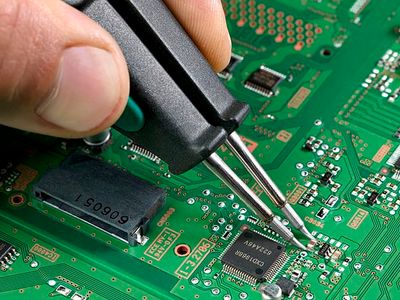Lectures, computer labs, and practical exercises. Oral exam.
FIL3237 Electronic System Design 7.5 credits

The course treats different aspects of printed circuit boards in electronic system design with the aim that the PhD student should learn to design, simulate and assemble an electronic system.
Information per course offering
Information for Spring 2025 Start 17 Mar 2025 programme students
- Course location
KTH Kista
- Duration
- 17 Mar 2025 - 2 Jun 2025
- Periods
- P4 (7.5 hp)
- Pace of study
50%
- Application code
60928
- Form of study
Normal Daytime
- Language of instruction
English
- Course memo
- Course memo is not published
- Number of places
Places are not limited
- Target group
- No information inserted
- Planned modular schedule
- [object Object]
- Schedule
- Schedule is not published
- Part of programme
- No information inserted
Contact
Carl-Mikael Zetterling (bellman@kth.se)
Course syllabus as PDF
Please note: all information from the Course syllabus is available on this page in an accessible format.
Course syllabus FIL3237 (Autumn 2020–)Content and learning outcomes
Course disposition
Course contents
- Evolution of Electronic Systems from Chips to Cabinets
- Printed Circuit Board-Manufacturing and Design
- High Speed & High Frequency Performance: Trace , Via Hole, Connector, Bonding Wire, and Package
- System Noise and Noise Budget Design
- Digital Signal Integrity in High-Speed Electronic Systems
- Power Supply Noise and System Grounding
- Power Distribution System and Decoupling Allocation
- EMC/EMI Fundamentals in Electronic Systems
- EMC/EMI: Common Mode Radiation and Shielding
- RF and Microwave Design Fundamentals
- ESD and Electrical Safety
- Thermal Management
- Specific environments: Space Electronics and Medical Electronics
- Sustainability and Environmental Aspects
- Soldering and use of KiCAD
Intended learning outcomes
After the course the students should be able to:
- Explain and apply basic principles and guidelines of physical architecture design for complex electronic systems, from printed circuits board (PCB) level to higher levels.
- Design PCB's with consideration of signal integrity and impedance matching.
- Analyze and budget the system noise.
- Design power distribution and analyze power supply related noises.
- Design impedance matching network for RF electronic systems.
- Analyze the influence of interconnects at different levels on electronic system performance.
- Analyze EMC/EMI in electronic systems.
- Model the performance of electronic system.
- Discuss sustainability aspects of electronics system design.
- Assemble a PCB with surface mounted and through hole components.
- Design PCB's with consideration of signal integrity and impedance matching.
Literature and preparations
Specific prerequisites
Enrolled as PhD student at KTH.
Recommended prerequisites
Masters degree in electrical engineering or equivalent, especially courses in electronic circuit theory and electromagnetic field theory.
Equipment
Computer
Soldering equipment
Literature
Parts of several different textbooks are used in this course. All are available electronically in KTHB.
Examination and completion
If the course is discontinued, students may request to be examined during the following two academic years.
Grading scale
Examination
- EXA1 - Examination, 7.5 credits, grading scale: P, F
Based on recommendation from KTH’s coordinator for disabilities, the examiner will decide how to adapt an examination for students with documented disability.
The examiner may apply another examination format when re-examining individual students.
Oral examination.
Other requirements for final grade
Oral exam and laboratory exercises are required for a passing grade in the course.
Opportunity to complete the requirements via supplementary examination
Opportunity to raise an approved grade via renewed examination
Examiner
Ethical approach
- All members of a group are responsible for the group's work.
- In any assessment, every student shall honestly disclose any help received and sources used.
- In an oral assessment, every student shall be able to present and answer questions about the entire assignment and solution.
Further information
Course room in Canvas
Offered by
Main field of study
Education cycle
Add-on studies
Contact
Supplementary information
The PhD student is encouraged to apply the practical parts in their research.